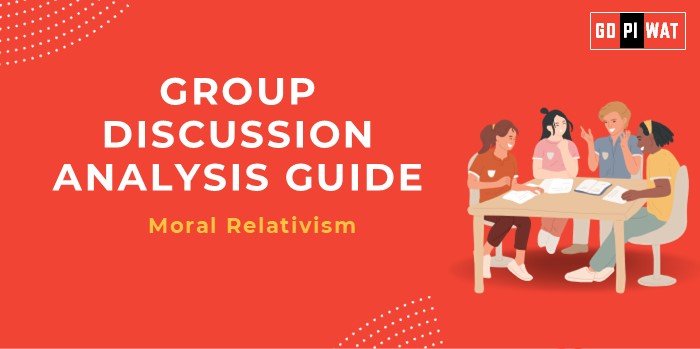📋 Group Discussion (GD) Analysis Guide: Moral Relativism
🌐 Introduction to Moral Relativism
Opening Context:
Moral relativism is a philosophy suggesting that ethical norms and values are culturally specific and can vary significantly between societies. This perspective has deep implications for understanding culturally different practices across the globe, especially in our interconnected world.
Topic Background:
Rooted in philosophical traditions like those of David Hume and Friedrich Nietzsche, moral relativism gained prominence in anthropology through the works of Franz Boas. Its objective has been to promote cultural understanding and tolerance. However, recent debates have questioned its ability to justify practices that clash with universal human rights norms.
📊 Quick Facts and Key Statistics
- 📜 UNESCO 2022 Report: 80% of cultures have distinct ethical norms regarding gender roles, property rights, and social justice.
- 🌍 Global Human Rights Watch: Approximately 45% of global countries have practices contested as cultural traditions versus human rights violations.
- 🌐 Globalization Impact: 65% of individuals surveyed believe globalization challenges cultural traditions.
- 📢 Amnesty International 2023: Reports highlight increased tension between cultural practices and universal ethics, especially in regions with entrenched traditions.
🧩 Stakeholders and Their Roles
- 🏛️ Governments: Legislators balance international laws with cultural traditions.
- 🌍 International Organizations: Bodies like the UN advocate for universal human rights while respecting cultural autonomy.
- 👥 Communities: Uphold traditions, often resisting external critiques.
- 📚 Academia: Frames theoretical discussions on relativism and ethics.
🏆 Achievements and Challenges
✨ Achievements:
- ✔️ Promotion of Tolerance: Increased global appreciation of cultural diversity.
- ✔️ Conflict Mediation: Relativist perspectives have eased international negotiations, such as in resolving indigenous rights disputes.
- ✔️ Anthropological Insights: Enabled better understanding of non-Western value systems.
⚠️ Challenges:
- ❌ Human Rights Violations: Cultural practices like female genital mutilation (FGM) spark ethical debates.
- ⚠️ Globalization Pressure: Erosion of traditions in the face of homogenized values.
- ❌ Philosophical Limitations: Lacks clarity on resolving ethical conflicts universally.
🌎 Global Comparisons:
- 🇸🇪 Successful Example: Scandinavian efforts to integrate immigrant practices into broader societal norms.
- 🌍 Challenging Example: Middle Eastern conflicts over women’s rights versus cultural norms.
💬 Structured Arguments for Discussion
- Supporting Stance: “Moral relativism promotes cultural understanding and discourages ethnocentric judgment.”
- Opposing Stance: “Certain practices justified by moral relativism, such as honor killings, contradict universal ethical principles.”
- Balanced Perspective: “While moral relativism fosters tolerance, it must coexist with frameworks addressing universal human rights.”
📚 Effective Discussion Approaches
Opening Approaches:
- 📜 Cultural Diversity Quote: “Mahatma Gandhi once said, ‘No culture can live if it attempts to be exclusive.’”
- 🤔 Contrast Example: Discuss conflicting values, e.g., Western gender equality versus arranged marriage traditions.
Counter-Argument Handling:
- ✔️ Acknowledge the practice’s cultural significance.
- ✔️ Provide universal ethical insights for balance.
- ✔️ Suggest collaborative resolutions, such as education campaigns.
📈 Strategic Analysis of Strengths and Weaknesses
- ✔️ Strengths: Promotes tolerance, enables cultural preservation.
- ❌ Weaknesses: Allows justification of harmful practices.
- 💡 Opportunities: Education on shared human values.
- ⚠️ Threats: Rising polarization due to globalization.
🏫 Connecting with B-School Applications
Real-World Applications:
- 🌟 Marketing: Understanding cultural nuances in product development.
- 🤝 Leadership: Navigating ethical dilemmas in multicultural teams.
Sample Interview Questions:
- ❓ “Can universal ethics coexist with cultural relativism in global leadership?”
- ❓ “How can businesses adapt their strategies to culturally diverse environments?”
Insights for Students:
- 💼 Relativism is vital for global negotiation and leadership roles.
- ⚖️ Ethical conflicts require culturally sensitive but firm resolutions.


